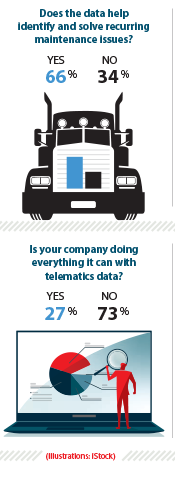Telematics data helpful, but fleets could do more: Survey
Telematics data is playing an ever-increasing role in trucking, but a majority of surveyed industry representatives believe their companies could still do more with the information.
Seventy-three percent of those who responded to a monthly TruckNews.com poll admitted their companies are not doing everything they can with telematics data.
Those participating in the monthly Pulse Survey said their businesses use telematics to monitor driver hours of service (81%), truck and load locations (80%), driver actions such as speed (77%), idle time (66%), and safety-related events (66%).
Almost two thirds (62%) monitored fault codes and 38% tracked equipment service reminders. And 66% of respondents said the data helps identify and solve recurring maintenance issues.
Truck drivers were most likely to interact with telematics devices using removeable tablets (48%), although 30% used smartphone apps, and 22% used in-cab hardwired devices.
Most of those surveyed (69%) were able to use existing ELDs when a federal mandate was first enforced in January. But the rules spurred 19% to introduce ELDs for the first time. Another 4% had to change ELD models to meet requirements for certified devices.
Almost half (52%) of those surveyed record road-facing video, and 11% monitor driver-facing video feeds. While 42% said video-based telematics systems infringe on a driver’s right to privacy, 64% said the benefits of such systems outweigh driver privacy concerns.
The survey included 128 responses. Full results will appear in the July-August edition of Today’s Trucking.
Pulse Reader Surveys are distributed through email and social media channels on a monthly basis, covering a variety of issues.

Have your say
This is a moderated forum. Comments will no longer be published unless they are accompanied by a first and last name and a verifiable email address. (Today's Trucking will not publish or share the email address.) Profane language and content deemed to be libelous, racist, or threatening in nature will not be published under any circumstances.